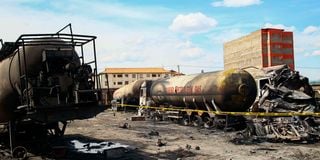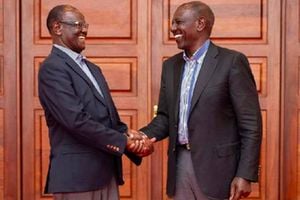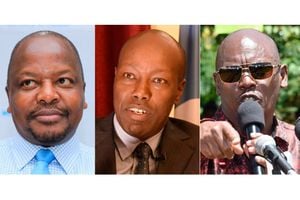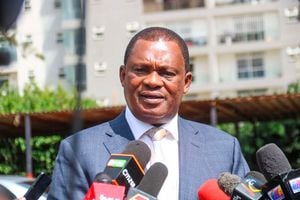Police officers’ long wait for compensation over Embakasi explosion

View of what remained after a huge gas blast in Embakasi Nairobi caused loss of lives, property and injuries on February 2, 2024.
On the night of February 2, 2024, a gas explosion in Embakasi killed 10 people and injured 300 others.
Among the injured were four police officers, who expected compensation under the Work Injury Benefits Act, a law which provides for financial awards to employees wounded in the line of duty.
The National Police Service had at the time contracted CIC Insurance for medical cover, and the underwriter paid the hospital bills. It is unclear whether CIC Insurance was to also pay the compensation packages under WIBA.
Mr Charles Ngari, Mr Adan Guyo, Mr Victor Njenga and Mr Fredrick Yegon lived next to Maxxis Energy, the explosion site. Mr Guyo and Mr Njenga sustained burns on their right hands. Mr Ngari suffered burns on his right cheek while Mr Yegon sustained burns on both his legs and neck.
Mr Ngari’s brother, Joseph, says that the Sh94,000 package is a pittance of the true loss the police officer underwent.
“My brother lost everything in the house, we had to make contributions and try to bring his life back to normal. Apart from that, it is no secret that he underwent a lot of pain,” said Joseph. “We have been patient with our brother and you can imagine since February 2024, he has never received the compensation.”
The Nation probe
Mr Ngari was in December informed that he will receive the payment, only to be told that CIC Insurance records indicated that the officer had two per cent second degree burns.
Medical records seen by Nation Africa, however, indicate that Mr Ngari was taken to Pemason Medical Center and on observation, he was found to have 30 per cent second degree burns on the right side of his face and head.
“He sustained second degree burns on his face and head,” reads a Police Surgeon Form medical report.
Efforts to present the case to the NPS are yet to bear any fruits, with Mr Ngari maintaining that he has evidence that the injury was more severe.
“It is really sad that even the insurer says that he suffered only two per cent burns,” Mr Ngari’s brother said.
A CIC Insurance representative referred Nation Africa to the human resource department of the National Police Service for clarification on the insurer hired for the WIBA compensations.
Nation Africa contacted police spokesperson Resilla Onyango on the compensation of the four officers who were burnt during the Embakasi explosion but she has not responded to our enquiries by the time of publishing this.
A police officer, who spoke on condition of anonymity, said that WIBA compensation can take longer than the 11 months Mr Ngari has waited for. The officer said that one needs to lobby and also keep on pressuring senior staff for them to get the payment.
“If you don’t know anyone or you are not a person who pressurizes you can even lose hope,” the officer, who spoke in confidence, said.
In November 2024, the matter was raised in the Senate by National Police Service Commission (NPSC) chairman Eliud Kinuthia, while appearing before the Senate's National Security, Defence and Foreign Affairs Committee.
Mr Kinuthia accused the defunct National Health Insurance Fund (NHIF) of colluding with commercial insurance providers to deliberately frustrate payment of millions of shillings in claims to police officers injured in the line of duty.
The unpaid claims relate to the Sh6.32 billion insurance cover for police and prison officers for two years - 2021 and 2022.
The claims relate to the Group Personal Accident and Work Injury Benefits Act (WIBA) schemes under the police cover.
The committee was told that one of the reasons the NHIF has refused to pay the outstanding claims is the introduction of a second medical reassessment, which is not required under the contract signed between the NPSC and the NHIF.
The contract stipulates that the assessment by the Directorate of Occupational Safety and Health Services (DOSHS) at the Ministry of Labour is final for the processing of claims.
On the second medical reassessment requirement, the committee accused the medical cover provider of siding with the co-insurers to frustrate the injured police officers, which DOSHS and NPSC said was illegal.





